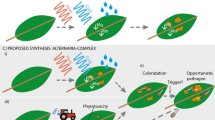Abstract
Oidium heveae is a major pathogen on Hevea brasiliensis in Ceylon. Following the private communication of results on zinc deficiency in this connexion, since published by Bolle-Jones and Hilton1, investigations were undertaken to see if this discovery had a practical bearing on the problem in Ceylon.
This is a preview of subscription content, access via your institution
Access options
Subscribe to this journal
Receive 51 print issues and online access
$199.00 per year
only $3.90 per issue
Buy this article
- Purchase on Springer Link
- Instant access to full article PDF
Prices may be subject to local taxes which are calculated during checkout
Similar content being viewed by others
References
Bolle-Jones, E. W., and Hilton, R. N., Nature, 177, 620 (1956).
Sandell, E. B., “Colorimetric Determination of Traces of Metals” (Interscience Publishers, 1950).
Young, H. E., R.R.S. (Ceylon) Combined Quarterly Circulars Nos. 3 and 4, pp. 6 and 17 (1949).
Author information
Authors and Affiliations
Rights and permissions
About this article
Cite this article
CONSTABLE, D. Foliar Zinc and Oidium heveae in Ceylon. Nature 178, 926–927 (1956). https://doi.org/10.1038/178926a0
Issue Date:
DOI: https://doi.org/10.1038/178926a0
Comments
By submitting a comment you agree to abide by our Terms and Community Guidelines. If you find something abusive or that does not comply with our terms or guidelines please flag it as inappropriate.



